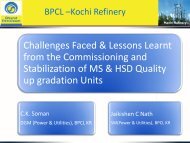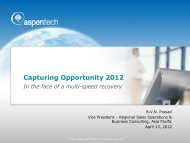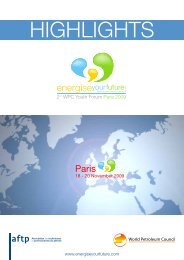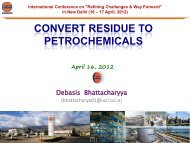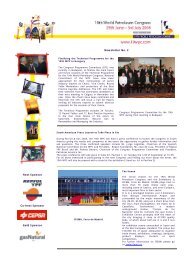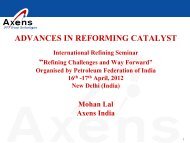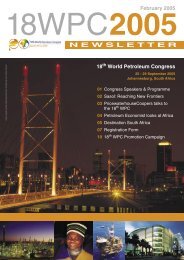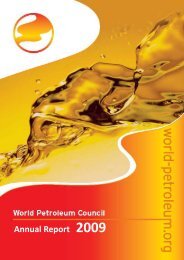PDF file of document - World Petroleum Council
PDF file of document - World Petroleum Council
PDF file of document - World Petroleum Council
- No tags were found...
You also want an ePaper? Increase the reach of your titles
YUMPU automatically turns print PDFs into web optimized ePapers that Google loves.
President’s Introduction‘Man & Energy’UNESCO, Paris, October 2006Today, more than ever before, man’s requirements for energy are immenseand ever-increasing throughout the world.Man’s development and evensurvival is dependent on it: heating, transport, drinking water are some <strong>of</strong> thebasic needs requiring energy for everyone.Energy consumption jumped 38% in the 2 decades from 1982 to 2002. Andthe rate <strong>of</strong> increase reduced only slightly over the period: + 20% between1982 and 1992, and 15% from 1992 to 2002. Energy comes largely from rawmaterials extracted from the ground (oil, gas, coal, uranium).Man has arrived at a turning point in his history. Fossil resources, which arethe forms <strong>of</strong> energy most used today, are going to become scarcer andscarcer. Over the last 20 years, the share <strong>of</strong> oil (more than 1/3 <strong>of</strong> worldconsumption in 2003 according to the IEA) has reduced, whereas the shares<strong>of</strong> gas (1/5 <strong>of</strong> world consumption) and <strong>of</strong> nuclear electricity (ca 6.5% <strong>of</strong> worldconsumption) have increased. Oil and gas now represent well over half <strong>of</strong>world energy consumption; with coal about one third. In 2003, renewableenergy sources represented 13.3% <strong>of</strong> energy consumed worldwide (2% in1980)–a massive growth! To meet the planet’s energy requirements, theywill all be necessary and all are complementary in their uses.However, 1.6 billion people in the world, more than 25% <strong>of</strong> earth’s populationhave no access to electricity and 2.4 billion people rely on wood, charcoal ordung as their principal source <strong>of</strong> energy for cooking and heating. Often thereal costs <strong>of</strong> these alternative energy sources are high relative to those <strong>of</strong>electricity or gas delivered through networks to wealthier households. Also,these energy sources can have high non monetary costs. When people spendmany hours collecting firewood or dung for heating and cooking, for example,they have less time for education or for developing other productive activities.In addition, the use <strong>of</strong> traditional energy sources can have serious health andenvironmental consequences. Two and a half million women and children dieeach year from the indoor pollution <strong>of</strong> cooking fires.Eighty-six percent <strong>of</strong> the world’s energy comes from fossil fuels. About 25% <strong>of</strong>the world’s population remains without adequate or quality energy resources.Renewable energy is far from being able to meet current and rising energydemands, and is likely to remain too expensive for the foreseeable future.Given these factors, it is necessary to render fossil fuels environmentallyacceptable until affordable, clean, and plentiful technologies are available.This is particularly important as major users such as China and India will beburning far greater quantities <strong>of</strong> fossil fuel in the years ahead.The aim is energy for all, sustainable development whilst improving socialcohesion and reducing poverty. In recent years there has been far moreintergovernmental co-operation, from action on acid rain and CFCs to climate
change and beyond. These governments are <strong>of</strong>ten helped and influenced byNGOs and public concerns.Ideally, we would have a plentiful, clean and affordable energy sources thatallow the world to operate in a sustainable manner. However, today's energytechnology cannot be scaled up quickly (and cleanly) to provide eleven billionpeople with a standard <strong>of</strong> living better than or equal to that we now enjoy. Thedevelopment <strong>of</strong> a sustainable energy base that can provide clean, cheap andcopious energy for everybody should be <strong>of</strong> the highest priority for all.Considering the Millennium Goals, we can aim for clean energy and a properenergy infrastructure that will help to fight poverty, hunger, infectious diseasesand child mortality.We need to do the following Raise the awareness <strong>of</strong> decision-makers at all levels Spread best-practice Encourage developed and developing countries to behave in a sociallyand ethical manner Ensure a strong level <strong>of</strong> public awareness and technical understandingThe panel discussion will identify what is required for everybody to understandthe energy challenges that lay ahead. The differences in approach betweendeveloped and developing countries will be put in context and related to socialresponsibility. It will stress the importance <strong>of</strong> energy in affecting humandevelopment and social cohesion and define the key elements that cancontribute to the reduction <strong>of</strong> extreme poverty.Some <strong>of</strong> the key points we will try to address here are: How can energy improve social cohesion? Is it an element whichencourages integration? Does it have a role and it so, what is it? To what extent is access to energy for all a determining factor in thereduction <strong>of</strong> poverty and extreme poverty? Many developing countries do not have energy policies and areeven less likely to have social energy policies, even though thiswould be for the use <strong>of</strong> the population One-<strong>of</strong>f actions are <strong>of</strong>ten prompted more by political considerationsthan by research into solutions to genuine problemsWe will get back to these points in the discussion, but first, here are thepresentations from around the world on our topic <strong>of</strong> Man & Energy.



